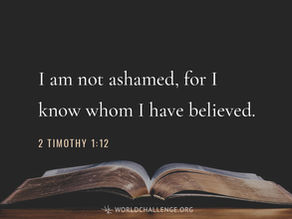Psalm 10 - When God Stands Far Off
- Chad Werkhoven
- Jul 11
- 5 min read
It may seem like the wicked always prosper, but be reminded the LORD is King!
CONTEXT: Psalm 10 is a direct extension of Psalm 9, which is attributed to David. Both psalms praise the LORD as the King forever, and both contain pleas for the LORD to come to the aid of His people.
Psalm 10
1 Why, Lord, do you stand far off?
Why do you hide yourself in times of trouble?
2 In his arrogance the wicked man hunts down the weak,
who are caught in the schemes he devises.
3 He boasts about the cravings of his heart;
he blesses the greedy and reviles the Lord.
4 In his pride the wicked man does not seek him;
in all his thoughts there is no room for God.
5 His ways are always prosperous;
your laws are rejected by him;
he sneers at all his enemies.
6 He says to himself, “Nothing will ever shake me.”
He swears, “No one will ever do me harm.”
7 His mouth is full of lies and threats;
trouble and evil are under his tongue.
8 He lies in wait near the villages;
from ambush he murders the innocent.
His eyes watch in secret for his victims;
9 like a lion in cover he lies in wait.
He lies in wait to catch the helpless;
he catches the helpless and drags them off in his net.
10 His victims are crushed, they collapse;
they fall under his strength.
11 He says to himself, “God will never notice;
he covers his face and never sees.”
12 Arise, Lord! Lift up your hand, O God.
Do not forget the helpless.
13 Why does the wicked man revile God?
Why does he say to himself,
“He won’t call me to account”?
14 But you, God, see the trouble of the afflicted;
you consider their grief and take it in hand.
The victims commit themselves to you;
you are the helper of the fatherless.
15 Break the arm of the wicked man;
call the evildoer to account for his wickedness
that would not otherwise be found out.
16 The Lord is King for ever and ever;
the nations will perish from his land.
17 You, Lord, hear the desire of the afflicted;
you encourage them, and you listen to their cry,
18 defending the fatherless and the oppressed,
so that mere earthly men
will never again strike terror.
Canons of Dordt
Article 4: The Inadequacy of the Light of Nature
There is, to be sure, a certain light of nature remaining in all people after the fall,
by virtue of which they retain some notions about God, natural things, and the difference between what is moral and immoral,
and demonstrate a certain eagerness for virtue and for good outward behavior.
But this light of nature is far from enabling humans to come to a saving knowledge of God and conversion to him—
so far, in fact, that they do not use it rightly even in matters of nature and society.
Instead, in various ways
they completely distort this light, whatever its precise character,
and suppress it in unrighteousness.
In doing so all people render themselves without excuse before God.
Summary
Psalm 10 begins with one of life's most difficult words. Certainly the word why isn't hard to pronounce or define; what makes it so difficult is its persistence. Our why's never quite find the satisfaction they demand in the answers they're given. Why is one of the first questions a child learns and one of the last a person mutters before death.
The why on David's mind as Psalm 10 begins is one of the most desperate of them all: Why, LORD, do you stand far off? Why do you hide yourself in times of trouble? Isn't it remarkable that someone that God described as being "a man after His own heart" would unload such an inquiry before Him? If even David felt abandoned by God at times, it's likely you will as well.
Mark Futato, my former professor whose excellent commentary on the Psalms has been referenced often in this space this year, writes,
There are times in our lives when it seems as if God is far off. God often seems distant, uninvolved, and unconcerned “in times of trouble” (9:9 and 10:1). Our personal anguish can become even more intense when, “in times of trouble,” we look around at those who have no time for God and who even despise God, yet they seem to be succeeding in every way. Psalms 9–10 teaches us how to respond in such situations. At the center of our response is our willingness to honestly pour out our heart to God, expressing to him exactly how we feel about his apparent distance and the apparent injustice of life. Such lamenting is not the complaining of ancient Israel in the wilderness, because surrounding this complaint is the plea for God to act. We may plead with the Lord in times of trouble. In spite of appearances, the Lord does see our trouble and grief. In his own time he will “arise” to help the helpless. With this assurance we can surround our sorrow with songs of praise.
Dig Deeper
The heart of David's lament helps illustrate this ugly doctrine of Total Depravity. This past week, we've come to understand that it doesn't mean that all people are totally evil. Rather, as the Canons put it, there is a certain light of nature remaining in all people after the fall.
This light can often lead to what appears to be a blessed life. Part of David's angst in Psalm 10 stems from the fact that the ways of the wicked man are always prosperous. This light of nature seems so adequately bright to sinners that they often say to themselves "Nothing will ever shake me." They swear "No one will ever do me harm."
But Canons go on to note that the wicked completely distort this light, whatever its precise character, and suppress it in unrighteousness. David poetically explains that the faint light of nature the wicked prosper under cements their own arrogance and pride, causing them to think that God will never notice that they reject His Law as they murder the innocent, catch the helpless, and crush their victims.
But even in his deep lament, David knows the truth. He knows that the LORD is King for ever and ever, and that He sees the trouble of the afflicted. Our King is the helper of the fatherless and defends the oppressed.
David knew, even here in the depths of Psalm 10, that God's grace is stronger than the wicked. You know that this grace has been forever applied to your life in and through our Savior, Jesus Christ, as you wait for God to replace the flickering, dim light of nature with the eternal light of His glory.
ACKNOWLEDGE WHO GOD IS: Our Father, who hears the desire of the afflicted;
ALIGN YOUR LIFE WITH GOD'S WILL: Pray that you will not simply be led by the light of nature, but will instead follow the true light of God's Word;
ASK GOD FOR WHAT YOU NEED:
Read the New Testament in a year! Today: Luke 11




















Comments